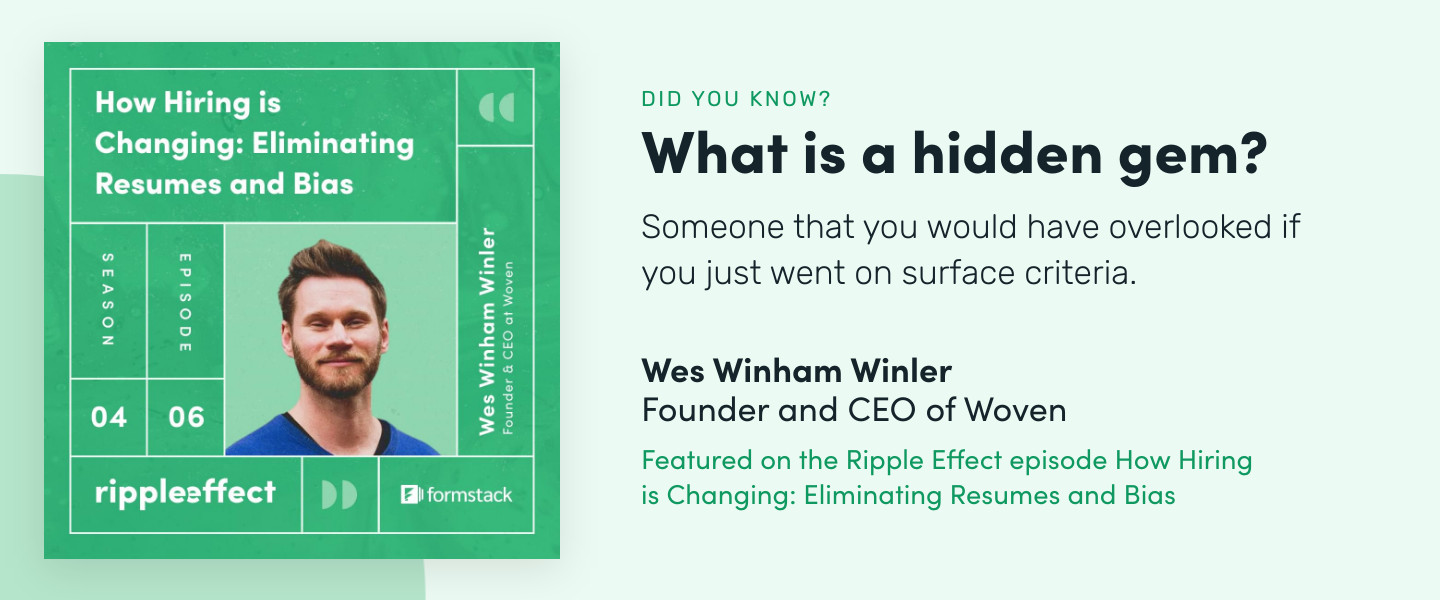“I hired someone who was a good person who was trying really hard. And I put him in a position where he was not going to be successful because my hiring process wasn't good enough.”
The story above is one Wes Winham Winler shares in the opening of the Ripple Effect podcast episode How Hiring is Changing: Eliminating Resumes and Bias.
As the head of engineering for a technology company for 10 years, Wes had to do a lot of hiring. In the beginning, he ran into issue after issue in sourcing, hiring, and retaining great talent.
But after doing some research, interviewing other hiring managers, and testing processes, he discovered why he was having such a difficult time. Wes found that many hiring systems, processes, and best practices were creating bias.
Once he made this realization, he knew he had to act. His hiring experiences and love for engineering led him to found Woven, a technical assessment platform that helps companies uncover hidden gems who are great engineers.
Wes recently joined us on Ripple Effect to discuss what he’s learned about hiring. He’s passionate about removing bias from hiring and reimagining how to source great candidates. As someone on the autism spectrum, he has a unique perspective on how to unearth candidates who may be traditionally cast to the side.
Below are three hiring strategies he believes can help any organization find great talent and uncover hidden gems.

Get It Now: Would you rather listen? You can get Wes’s Ripple Effect episode How Hiring is Changing: Eliminating Resumes and Bias here.
Stop relying solely on resumes.
“My goal is to not look at resumes until I've evaluated the screening questions. They're going to tell me much more about the relevant experience than the resume.”
Early on in his career, Wes made the realization that hidden gems were slipping through the cracks of his hiring process. But what exactly is a hidden gem? According to Wes, it is “someone you would have overlooked if you just went on surface criteria.”

Oftentimes during the hiring process, recruiters and talent ops put most—if not all—their focus on resumes. Resumes can be helpful, but Wes believes they lack a lot of context. “The thing about a resume is it’s generic. It's about the person and their general guess for what is interesting.”
Wes finds that relying on resumes as the initial screener pushes a lot of great talent out of the running. The combination of narrow job requirements, specific position keywords, required backgrounds, and “must have” experience can make it incredibly difficult for many people to move forward based solely on a resume.
Instead of basing the initial rounds of hiring on resumes alone, Wes likes to add specific screener questions to job applications. These questions can provide much more context than a resume and give hiring teams a better holistic understanding of candidates in the pipeline.
Related: How to Improve Your Hiring Process and Win the War for Talent
Add take-home projects into your hiring process.
“If you're going to hire dancers, you should probably watch them dance.”
Wes received the advice above when interviewing managers on his quest to rethink his hiring processes. When reviewing feedback, adding a project into the hiring process was one hiring tip many managers gave Wes.
Once he integrated this step into his hiring, he found major success. Whether you’re hiring a marketer, HR professional, engineer, or sales person, adding in a project to your hiring workflow can help you identify which candidates are the best fit for the role.
Adding a project can also help you uncover hidden gems. As mentioned above, resumes can create bias or barriers to advancing particular candidates forward. If you have candidates do a take-home project, even a small one, it may completely alter your decision on who moves forward in the process.
During his Ripple Effect episode, Wes discusses an instance where he saw this play out firsthand when trying to hire a software engineer. Instead of selecting candidates based on their resumes, he had them do a small project. When he got the projects back, the best one came from a very surprising candidate:
“I go back and look at this candidate's resume, and he has zero years of experience. That was just shocking that the best candidate in my candidate pool was someone that if I would have read his resume first, I absolutely would have rejected this candidate. That was the light bulb moment for me that there are hidden gems out there, and that kind of kicked off this mission of how can we build something to find them?”

Seek those who are different.
“I am a bit more aware that some people are different, which I think we all need to be reminded of constantly because it is so easy to just assume everyone is the exact same as you.”
The way we are wired can set us up for failure when it comes to creating fair hiring practices. Research shows that we tend to prefer people similar to us, which can have a huge impact on who moves forward in a job pool and who eventually gets hired.
One thing Wes advocates for during the hiring process is taking the time to identify your own biases and instill habits, practices, and strategies that can help you minimize them. It can be easy, sometimes even automatic, to make a poor judgement about somebody simply because they are different from you. “It's really interesting how different groups of people have settled on norms that totally work for them as long as everyone agrees. But as soon as you have people with different norms, everyone thinks people are rude or they don't get the message.”
Wes points out that people often hire candidates who are similar to them, whether intentionally or unintentionally. He also mentions that it goes beyond personality or demeanor; we sometimes even hire people with similar strengths because those are easier for us to identify.
Creating a hiring process that focuses on diversity and inclusion is important for candidates, employees, and business as a whole. It takes time, focus, and intentionality from everyone involved in the hiring process to ensure your systems are fair and unbiased. Organizations should consider bringing in an outside expert from time to time to audit systems to ensure they are unbiased and sourcing talent from many different backgrounds and experiences.

Listen Now: Learn more about what we can all do to build more diverse workplaces in the podcast episode The Importance of Mentorship, Diversity, and Betting On Yourself.
Discover hidden gems in your hiring now.
Hiring great talent is difficult, especially in today’s crazy job market. We hope some of Wes’s tips help you uncover hidden gems who may have been previously overlooked. Once hired, these employees can help transform your organization and bring a lot of value to the table. Sometimes you just have to look past a resume and make a few tweaks to your processes to find them.
Wes shares many other great tips for discovering hidden gems in his Ripple Effect podcast episode How Hiring is Changing: Eliminating Resumes and Bias. Listen now on our website or on your podcast provider of choice.











